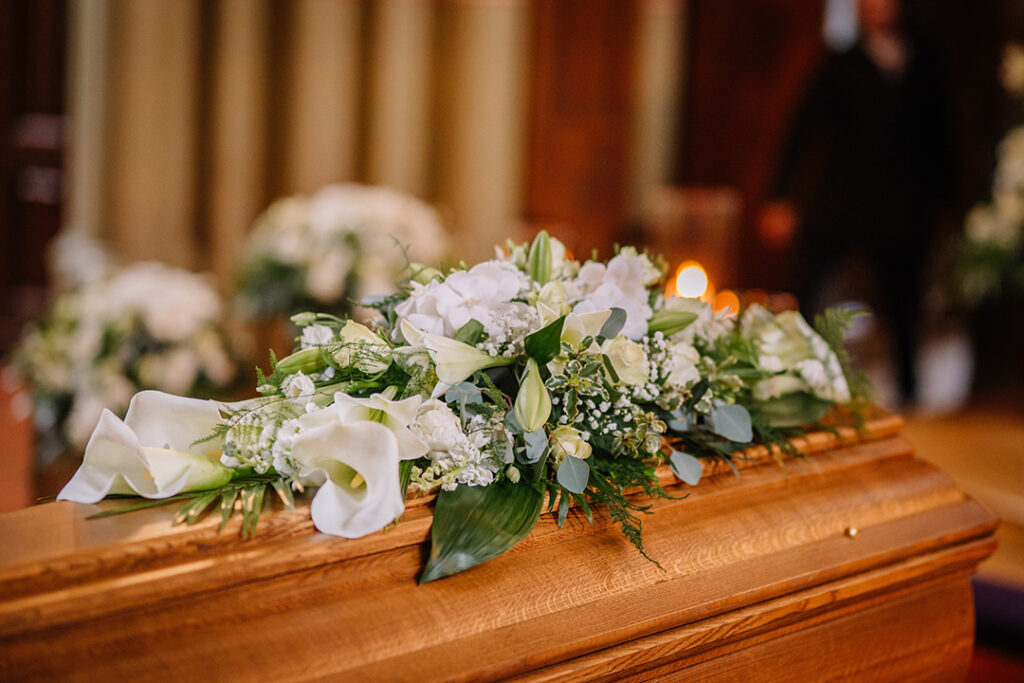Birth, marriage and no funeral: The decline in funerals in the UK
Birth, marriage and no funeral: The decline in funerals in the UK
Recent polling shows 47% of UK citizens are unsure they want a funeral. What does this tell us about our relationship with death and grief?
In the past decade, the relationship between individuals and death, grief, and funerals has been shifting. In the UK and Europe, the idea of a large, public Christian funeral with a church full of mourners is no longer the norm.
This shift has been detailed in a 2023 report by Theos, a British religious studies think tank, showing that less than half (47%) of the UK population were sure they wanted a funeral at all.[1] The report details a range of reasons behind this decline, including shifting religious and spiritual beliefs as well as the significance of financial pressure.
This article will reflect on the findings of the report and how it has been received. Moreover, it will conclude with some thoughts on how such changes are also occurring across Europe and what this tells us about how UK citizens and Europeans deal with death in the present day.
Responses to death and dying in the UK
The new Theos report, Love, Grief, and Hope: Emotional responses to death and dying in the UK,has produced several key findings regarding the “significant realignment of British grieving practices.” Over the past decade, traditional Christian funerals[2] have notably declined in popularity. Specifically, in England, the amount of people opting for Church of England funerals dropped from 37% in 2009 to 23% in 2019, marking a 14% decrease.[3]
This shift is largely attributed to the changing religious landscape in the UK, affecting end-of-life choices. Theos’ research reveals that 76% of regular worshippers express a desire for a funeral, in contrast to 38% of non-attenders. Religious individuals tend to be more decisive about end-of-life ceremonies, with 31% of non-attenders uncertain about their preferences. Additionally, those perceiving funerals as having a clear spiritual purpose are more inclined towards wanting a funeral (58% vs. 41%).[4]
Generational differences
Interestingly, despite evidence that shows the younger generation is more likely to be non-religious,[5] this report shows how the decline in British funerals is not driven by younger people. Instead, under-35s were more likely to want a funeral than 35-and-overs. The 55-and-over category shows a slightly higher inclination to reject funerals, suggesting that older citizens are actively opting out of traditional funeral practices.[6]
Financial considerations
The cost of funerals also plays a role in some individuals’ decisions not to have a funeral. SunLife, a life insurance company, estimates the UK’s average ‘cost of dying’ at £9,200 (€10,718). Costs vary across Europe: from an average of €3,500 in Spain[7] to €13,000 in Germany.[8] In the UK, the increase in the number of funeral suppliers means that funeral companies compete to push up the price. During a cost of living crisis, these costs can be a barrier to some individuals planning funerals.
The implications of direct cremation
Finally, the report emphasises the growing trend toward foregoing any form of ceremony at all. More individuals are opting for ‘direct cremation’ where the deceased is cremated without a formal ceremony. This choice, influenced partly by the COVID-19 pandemic’s restrictions on funeral gatherings, has become increasingly popular and now accounts for 18% of deaths.[9]
The report stresses that this rise could have serious implications for how grief is managed across society. It highlights worries that the absence of meaningful grieving spaces and social support typically provided by funerals may lead to unresolved grief. Funerals serve as vital spaces for acknowledging death explicitly. Without any form of ceremony, whether religious or not, crucial rituals marking the end of someone’s life might be lost, potentially impacting the grieving process.
What does the public think?
Following Theos’ report, Archbishop of Canterbury, Justin Welby, expressed concern that society might be forgetting how to “cope with loss.”[10] He cautioned against perceiving death as costly, time-consuming, or insignificant, emphasising the danger of a future where discussing death becomes taboo and grieving is deemed shameful.[11]
However, the report’s findings led freelance journalist Yvonne Roberts to introspect about her own feelings on mortality. She has decided, like 47% of the British public, that she will not have any celebrations or eulogies. Instead, she hopes to “occasionally pop back in the shape of a memory.”[12] Journalist Clare Barnett underscores the importance of planning end-of-life preferences beforehand, enabling loved ones to grieve without grappling with funeral decisions.[13]
Moreover, the National Society of Allied and Independent Funeral Directors (SAIF) unsurprisingly disagreed with some of the media’s interpretations of Theos’ report. Many news outlines have stressed the 47% of people who are unsure whether they want a funeral. However, the report also finds that 61% of people see funerals as a space for mourning with others and 52% agreed that funerals are a way to support the bereaved. For SAIF, whilst there has been a shift to increased direct cremation, they are confident funerals “will remain a vital institution, offering human connection and comfort in a world transformed by technology.”[14]
What does this tell us about our relationship with death and grief?
In conclusion, the findings of the report and the public’s reactions to it tell us a lot about our relationship with death and grief in the UK and Europe. It is clear that in the case of the UK, it is a “nation of paradox when it comes to memorialisation of the dead.”[15] On the one hand, there is an agreement that a funeral should celebrate life but, on the other hand, an increasing number of people would prefer to die without the fuss of a funeral.
What is also clear is that across Europe, societies have still not fully come to terms with death and much fear still surrounds the idea. The fear of death is a universal human experience and as Archbishop Justin Welby said, there is a risk that without funerals or ways of marking the end of one’s life, as a society we will not adjust to coping with loss. This could lead to an increasing fear of death rather than an embrace of its inevitability, something that can lead to a “deeper appreciation for the preciousness of life.”[16]
Want to learn more about similar topics? Go to the EARS Dashboard.
Sources
[1] Love, Grief, and Hope: Emotional responses to death and dying in the UK
[2] A traditional Christian funeral usually includes a sermon from the priest, readings from the Bible, prayers, and hymns. The deceased are then buried in a consecrated church graveyard.
[3] Love, Grief, and Hope: Emotional responses to death and dying in the UK
[4] Love, Grief, and Hope: Emotional responses to death and dying in the UK
[5] UK secularism on rise as more than half say they have no religion
[6] Love, Grief, and Hope: Emotional responses to death and dying in the UK
[7] How expensive is a funeral?
[8] Funerals In Germany [Regulations, Costs & Traditions]
[9] Love, Grief, and Hope: Emotional responses to death and dying in the UK
[10] Justin Welby warns society is forgetting how to ‘cope with loss’ as most Britons do not want a religious service when they die due to high costs and a loss of faith | Daily Mail Online
[11] Justin Welby warns society is forgetting how to ‘cope with loss’ as most Britons do not want a religious service when they die due to high costs and a loss of faith | Daily Mail Online
[12] Exit strategy: why I’ll be saying no to a funeral | Bereavement | The Guardian
[13] The untimely death of the funeral
[14] Are people really turning off funerals? We don’t think so
[15] Love, Grief, and Hope: Emotional responses to death and dying in the UK
[16] Embracing the inevitable: Religion’s perspective on death anxiety






